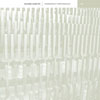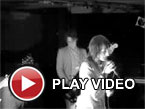Richard Chartier, "Transparency (Performance)"
 Celebrating the LINE label's status as a separate entity and Chartier's 2010 Smithsonian fellowship (as well as his 40th birthday), Transparency is the document of an hour long performance using the historic Grand Tonometer as it’s primary source. The result is a subtle piece that is captivating, but also demanding
Celebrating the LINE label's status as a separate entity and Chartier's 2010 Smithsonian fellowship (as well as his 40th birthday), Transparency is the document of an hour long performance using the historic Grand Tonometer as it’s primary source. The result is a subtle piece that is captivating, but also demanding
The Grand Tonometer is an instrument built by Rudolph Koenig, consisting of 692 tuning forks ranging over four full octaves.Transparency utilizes recordings of many of the forks, in addition to wooden and metal resonators that skillfully blend the pure natural vibrations with crafted, digital variations of them.
The opening, chiming notes show their underlying source rather clearly, but quickly are stretched out for long, drawn out passages via processing.Arriving early and becoming a consistent element are ultrasonic tones that hover near the inaudible end of the spectrum, but thankfully are at a moderate enough volume to keep this from becoming an endurance test.
Changes are subtle, but perceptible in the expansive resonances and reverberations, and the more frigid passages are interrupted nicely by little blurts of tonal bliss, as well as some percussive, crunchy wooden clicks.The latter sound almost like they could be accidents from the source recordings, but are too fascinating and varied for me to believe that's actually the case.
As the piece goes on, there is a greater emphasis on the lower frequencies that counterbalances the shimmering metal tones.At some points there are even some heavy low-end swells that are almost jarring when they appear to balance out the sharper moments.
The closing minutes are almost visceral in their effect:some of the higher frequencies I could almost feel in my throat and teeth but, again, not in a painful way.The piece ends as it opened, with the obvious sounds of reverberating tuning forks chiming the piece to its completion.
The only weakness here is that I needed to dedicate my full attention to listening to the piece in its entirety.While I'd never think that Chartier’s work is something to throw on at parties in the background, normally this sort of work I’m ok to put on while reading or writing, but I noticed that lead to me actually tuning the album out.Since the piece is over an hour, that means true dedication is needed to fully enjoy Transparency, but the reward is worth it.
samples:
 



